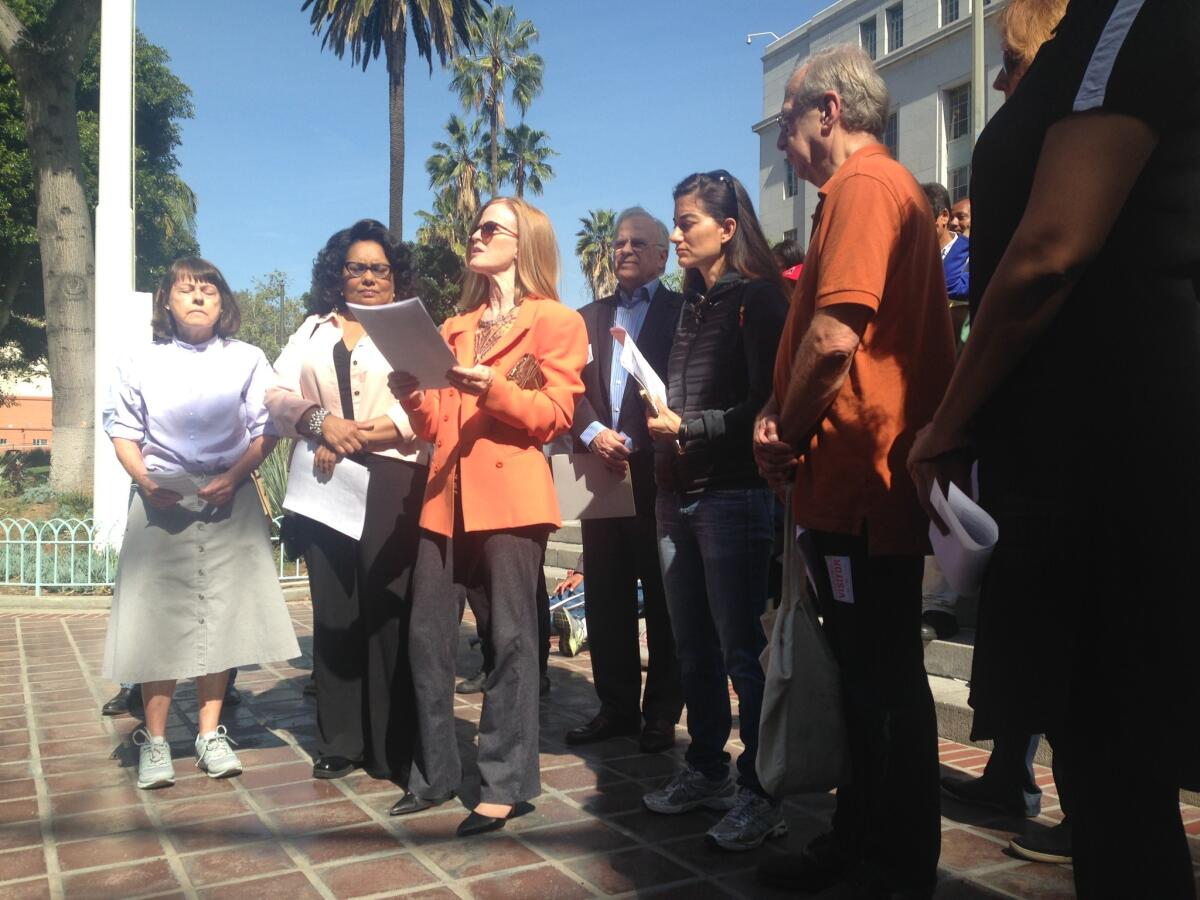Coalition targeting massive L.A. developments puts off ballot measure until 2017

Members of the Coalition to Preserve L.A., appearing outside City Hall, said Tuesday they had changed their strategy for winning passage of their planned Neighborhood Integrity Initiative -- rewriting the measure and shifting their focus to the March 2017 election.
Backers of a ballot measure to crack down on L.A. real estate “mega-developments” announced a sharp change in tactics Tuesday, saying they have rewritten their proposal and abandoned their drive to reach the Nov. 8 ballot.
The Coalition to Preserve L.A., a group backed by the Hollywood-based AIDS Healthcare Foundation, said it would start a new round of signature-gathering while targeting the March 2017 municipal election ballot, when voters choose a mayor and eight council members.
Coalition spokeswoman Jill Stewart said her group’s proposal -- billed as a way to stop “reckless approval of outsized development projects” -- would have been overshadowed by an assortment of tax hikes, wage increases and other measures planned for the state ballot.
“Our initiative is way too important to be buried at the tail end of this November’s ballot,” said Stewart, standing with supporters outside City Hall.
First announced last year, the group’s Neighborhood Integrity Initiative has set off a heated debate over the effects of the region’s real estate boom -- and the City Council’s longstanding practice of approving changes in height, density, parking requirements and other rules for individual real estate projects.
Stewart’s group has argued that traffic-weary voters will embrace the proposal, which includes a two-year moratorium on development projects that need more lucrative zoning or other rule changes.
Foes of the measure described Tuesday’s shift in strategy as a tacit admission that the Neighborhood Integrity Initiative was on track to lose in a presidential election year, when voter turnout reaches its peak.
“They realized that they can’t win in November, and they’re election shopping now,” said Mike Shimpock, spokesman for the Coalition to Protect L.A. Neighborhoods and Jobs, which is composed of labor unions, business groups and affordable housing developers, among others.
Shimpock said he expects voter participation to decline by nearly two-thirds in L.A. between the November statewide election and the March municipal one. By switching to March, turnout will drop significantly among renters and low-income families -- voters who would be disproportionately affected by the measure, he said.
“They’re trying to disenfranchise the voters who are mostly likely to oppose this,” Shimpock added.
Alice Callaghan, who favors the ballot measure and runs the Las Familias del Pueblo service center in skid row, said the change in timetable would put real estate development front and center in the city campaigns for mayor and other seats.
Callaghan, an anti-poverty activist, said she initially opposed the idea of moving to the March 7 election. But she later concluded that voters would be frustrated with a long list of ballot measures.
“My experience is, after the third [measure], they just start checking no, no, no, no, no,” she said.
Backers of the ballot proposal, including Callaghan, say new housing being built in downtown, Hollywood and elsewhere is replacing rent controlled apartments and forcing out working families. Opponents warn the ballot proposal would hurt renters by severely restricting housing production.
Stewart said backers of the proposal rewrote their measure in recent days to make it shorter and offer new provisions that protect affordable housing.
The revised ballot proposal still has a two-year moratorium on certain large- and mid-sized development projects. But housing developments that are 100% affordable will be exempt from the moratorium, Stewart said.
That change was made in response to affordable housing providers, Stewart said, adding, “We listened to the community.”
Follow @DavidZahniser for what’s happening at Los Angeles City Hall
More to Read
Sign up for Essential California
The most important California stories and recommendations in your inbox every morning.
You may occasionally receive promotional content from the Los Angeles Times.











